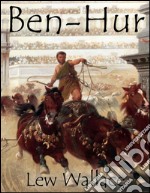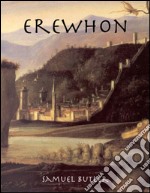Lew Wallace eBooks
eBooks editi da Lew Wallace di Formato Epub
Ben Hur. E-book. Formato EPUB Lew Wallace - Lew Wallace, 2016 -
The Jebel es Zubleh is a mountain fifty miles and more in length, and so narrow that its tracery on the map gives it a likeness to a caterpillar crawling from the south to the north. Standing on its red-and-white cliffs, and looking off under the path of the rising sun, one sees only the Desert of Arabia, where the east winds, so hateful to vinegrowers of Jericho, have kept their playgrounds since the beginning. Its feet are well covered by sands tossed from the Euphrates, there to lie, for the mountain is a wall to the pasture-lands of Moab and Ammon on the west--lands which else had been of the desert a part. The Arab has impressed his language upon everything south and east of Judea, so, in his tongue, the old Jebel is the parent of numberless wadies which, intersecting the Roman road--now a dim suggestion of what once it was, a dusty path for Syrian pilgrims to and from Mecca--run their furrows, deepening as they go, to pass the torrents of the rainy season into the Jordan, or their last receptacle, the Dead Sea. Out of one of these wadies--or, more particularly, out of that one which rises at the extreme end of the Jebel, and, extending east of north, becomes at length the bed of the Jabbok River--a traveller passed, going to the table-lands of the desert. To this person the attention of the reader is first besought. Judged by his appearance, he was quite forty-five years old. His beard, once of the deepest black, flowing broadly over his breast, was streaked with white. His face was brown as a parched coffee-berry, and so hidden by a red kufiyeh (as the kerchief of the head is at this day called by the children of the desert) as to be but in part visible. Now and then he raised his eyes, and they were large and dark. He was clad in the flowing garments so universal in the East; but their style may not be described more particularly, for he sat under a miniature tent, and rode a great white dromedary.
Ben-Hur: a tale of the Christ. E-book. Formato EPUB Lew Wallace - Lew Wallace, 2016 -
Ben-Hur: A Tale of the Christ is a novel by Lew Wallace published for the first time in 1880. Considered "the most influential Christian book of the nineteenth century", it was the best-selling American novel from the time of its publication, superseding Harriet Beecher Stowe's Uncle Tom's Cabin (1852). Following release of the 1959 MGM film adaptation of Ben-Hur, which was seen by tens of millions and won 11 Academy Awards in 1960, book sales surpassed Gone with the Wind. The story recounts the adventures of Judah Ben-Hur, a Jewish prince and merchant in Jerusalem in the 1st century. Judah's childhood friend Messala returns home as an ambitious commanding officer of the Roman legions. During a military parade, a tile falls from the roof of Judah's house and barely misses the Roman governor. Although Messala knows that they are not guilty, he condemns the Ben-Hur family. Judah is sent to the Roman galleys for life; his mother and sister are imprisoned and all the family property is confiscated. Jewish prince Judah Ben-Hur is betrayed by his childhood friend Messala and sentenced to life as a Roman slave. During a pirate attack in the Aegean, Ben-Hur saves the life of a galley commander, his fortunes improve and he returns to Galilee a free man. There, his quest for vengeance turns into insurrection, but his life is transformed when he witnesses Christ’s baptism by John the Baptist.
Erewhon (Unabridged). E-book. Formato EPUB Samuel Butler - Lew Wallace, 2016 -
Erewhon is a novel by Samuel Butler, published anonymously in 1872. The title is also the name of a country, supposedly discovered by the protagonist. In the novel, it is not revealed where Erewhon is, but it is clear that it is a fictional country. Butler meant the title to be read as the word Nowhere backwards, even though the letters "h" and "w" are transposed, therefore Erewhon is an anagram of nowhere. The book is a satire on Victorian society. The first few chapters of the novel dealing with the discovery of Erewhon are in fact based on Butler's own experiences in New Zealand where, as a young man, he worked as a sheep farmer on Mesopotamia Station for about four years (1860–1864), and explored parts of the interior of the South Island. Sometimes compared to Gulliver's Travels (1726), a classic novel by Jonathan Swift; the image of Utopia in this latter case also bears strong parallels with the self-view of the British Empire at the time.


